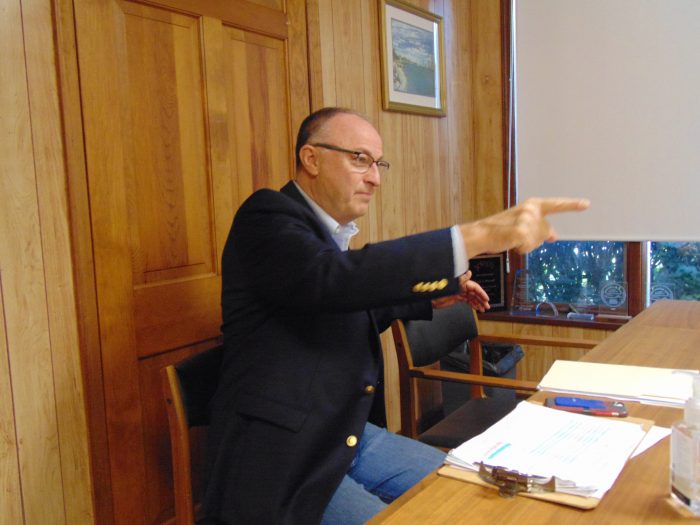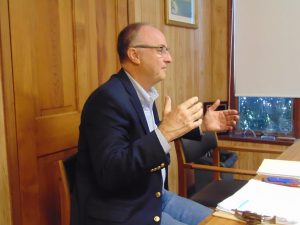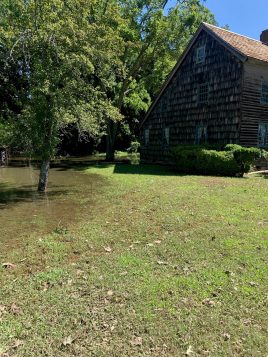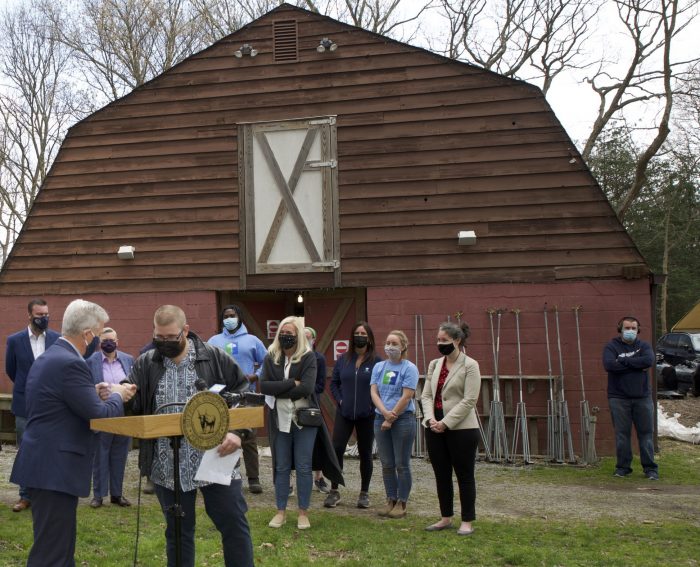Residents in the Town of Huntington will have three options for their new supervisor Nov. 2.
Two councilmen and a newcomer are on the ballots, each bringing their own expertise to the table.
With current town Supervisor Chad Lupinacci (R) not seeking reelection, Huntington will have a new supervisor in January. Two town council seats are also up for grabs in next month’s election.
Ed Smyth (R), of Lloyd Harbor, has served as town councilman for four years and is now seeking the top position, while councilman Eugene Cook, of Greenlawn, is running as a third-party Independent candidate. Cook is a former Republican who unsuccessfully sought the GOP nomination for supervisor.
Democratic candidate Rebecca Sanin, president and CEO of nonprofit Health & Welfare Council of Long Island, is seeking supervisor and said her years as a public servant can bring a new perspective to Huntington.
Eugene Cook
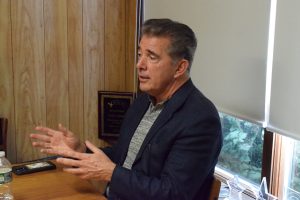
Cook has been a councilman in the town for the last 10 years and is running for supervisor on a Stop LIPA Party line.
A businessowner of more than 40 years, Cook said he is “strictly business and it’s all about money.”
“We have to run each town and municipality as a business,” he said. “And that hasn’t happened.”
Cook said he has been “very disappointed to see the last four years” because things “haven’t gotten done” during Lupinacci’s term.
“There is no transparency, and there’s some real problems with that,” he said.
Cook’s idea for the future of Huntington is working it as a business.
“We have all these great ideas that people want to do, but it costs a lot of money to do that,” he said. “You have to manage the money to get it done.”
Before the COVID-19 pandemic, Cook closed his construction business and retired.
“I’ve never been happier,” he said, “And I’ve never been busier.”
As councilman, Cook has “fought tirelessly to hold the line on taxes and spending while maintaining balanced budgets.”
He said that if he takes on the role of supervisor, he will “continue to champion the cause of a better Huntington for the future, while respecting Huntington families, residents, business owners and taxpayers.”
Rebecca Sanin
Sanin, who resides in Huntington Station, said that over the last four years, she has been working on small business and nonprofit sustainability. With her nonprofit experience, she has helped with issues including health equity and hunger relief for Long Island.

“What I’ve seen during COVID-19 is how important it is to have government pull the levers to really improve the quality of people’s lives,” she said.
Prior to joining Health & Welfare, Sanin was an assistant deputy county executive in Suffolk County, where she led the performance management team. The mother of two daughters chose to raise them here because she loves the community.
“I love this town,” she said. “I don’t believe that it has been properly managed for the last few years and I’m particularly concerned about the lack of a strong COVID recovery plan in our town and what’s happening with our small businesses.”
Sanin said that she is different than her two opponents because she is currently not an elected official and does not work in the town.
“I have a fresh set of eyes that I’m bringing to town government and also a very different perspective on how things need to run when it comes to the budget,” she said.
Ed Smyth
Smyth’s parents moved to Huntington in 1971 and he stayed to raise his four children there, too. Elected to the Huntington Town Board in 2017, he voted to enact term limits and to make the resolution process more transparent to the community.
He has voted to preserve open space and slow down overdevelopment in downtowns, but his biggest concern was to settle the LIPA lawsuit.
Now on the ticket for supervisor, Smyth said he is running on an infrastructure platform — focusing on sewers, drainage and roadways.
“I look at the town as a whole, having been living here my entire life, and I see areas of town that have been neglected that I want to address, particularly Huntington Station,” he said.

He said that it is “vitally important” to get a sewer line put in from Huntington railroad station south to Walt Whitman Mall, which currently does not have a sewer line.
“That’s the driving reason why there hasn’t been any capital investment in the Huntington Station area,” he said. “There is federal money available to do that.”
Smyth is a practicing lawyer in Huntington village for the last 24 years.
He is also a veteran — a former Marine staff sergeant — which he said gives him a different style of management compared to Lupinacci.
“He has taken a very hands-off approach,” Smyth said. “That’s not my style. I will be very involved with every department and be hands-on.”





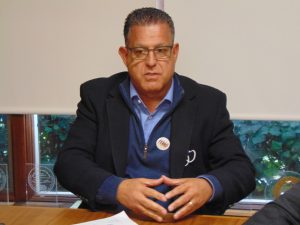

 Overall, the candidates confirmed their commitment to seeing a change in the way local government sees the people and, perhaps more introspectively, sees itself. Ferro said he’s more than used to working with electeds on both sides of the aisle. Schramm, as an openly gay man who lives with his life-partner Steve, said he would work toward a more inviting Huntington for everyone. “Our Town Hall needs to start having people provide sign language at Town Board meetings,” he said. “We need to include everybody in our community. We need to be a welcoming Town Hall.”
Overall, the candidates confirmed their commitment to seeing a change in the way local government sees the people and, perhaps more introspectively, sees itself. Ferro said he’s more than used to working with electeds on both sides of the aisle. Schramm, as an openly gay man who lives with his life-partner Steve, said he would work toward a more inviting Huntington for everyone. “Our Town Hall needs to start having people provide sign language at Town Board meetings,” he said. “We need to include everybody in our community. We need to be a welcoming Town Hall.”